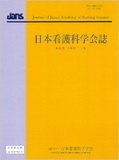Japanese
English
- 販売していません
- Abstract 文献概要
- 参考文献 Reference
要旨
目的:地域に在住する中高年者が自己の認知症発症に抱く感情を解明し,その特徴を考察する.
方法:研究デザインには,質的記述研究デザインを採用した.半構造化面接法を用いて,地域のサークルや老人クラブに所属する中高年者13名からデータを収集し,分析した.
結果:対象者は,男性6名,女性7名であり,年齢は60歳から91歳の範囲であった.また,認知症者と接したことのある者は12名(92.3%)であった.分析の結果,40コードを導出した.これらのコードは,24サブカテゴリ,13カテゴリを形成し,最終的に,自己の認知症発症に抱く感情を表す6コアカテゴリが明らかになった.それらは,【恐怖】【懸念】【脅威】【否認】【諦め】【安心感】であった.
結論:認知症に関する否定的な知識および見解が,地域に在住する中高年者に自己の認知症発症への否定的な感情を抱かせる可能性が示唆された.認知症に関する正確な知識の普及と専門職による良質なケアの提供が求められる.
Purpose: This study examined the emotions associated with the development of dementia among the middle-aged or older adults living in community.
Methods: A qualitative descriptive research method was adopted in this study. Data were collected through semi-structured interviews from 13 middle-aged or older adults who belonged to several clubs.
Results: The participants were six men and seven women aged 60-91 years. Twelve participants (92.3%) had contact with people with dementia. Consequently, 40 codes, 24 sub-categories, and 13 categories were formed, and the following six core categories representing the emotions associated with developing dementia among the middle-aged or older adults living in community were identified: (a) fear, (b) apprehension, (c) threat, (d) denial, (e) despair, and (f) relief.
Conclusions: The middle-aged or older adults worry about dementia due to unfavorable knowledge. Thus, there is a need to promote sufficient knowledge about dementia among the middle-aged or older adults and provide good care via professionals for people with dementia.
Copyright © 2022, Japan Academy of Nursing Science. All rights reserved.


